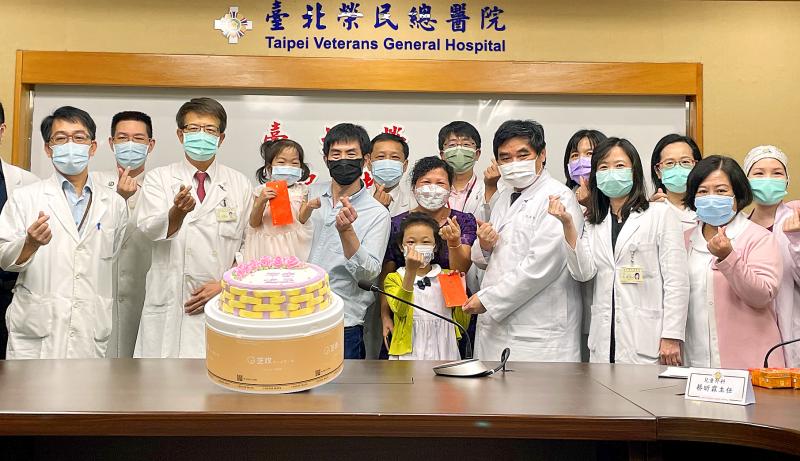The kidneys of a deceased one-year-old have been transplanted into a four-year-old and an eight-year-old so that they can avoid a lifetime of dialysis, Taipei Veterans General Hospital said yesterday.
In August last year, a four-year-old girl surnamed Lee (李) and an eight-year-old girl surnamed Hsu (許) each received a kidney from the 15-month-old, who only weighed 9.8kg.
He is Taiwan’s lightest-ever deceased organ donor, and it was the first recorded time in Taiwan that two kidneys from one donor were successfully transplanted into two children, the hospital said.

Photo: CNA
Lee was the youngest patient on hemodialysis in Taiwan after experiencing septic shock following a spontaneous rupture of the stomach three days after her birth, Pediatric Surgery Division director Tsai Hsin-lin (蔡昕霖) said.
Lee, who had severe abdominal adhesions from several gastrointestinal perforations, could not undergo peritoneal dialysis, but had been on long-term hemodialysis, he said, adding that she had a high risk of rejecting the new organ.
Before she was one month old, Hsu had acute kidney failure following surgery for a congenital heart condition, he said, adding that she later developed chronic kidney disease and had been on dialysis for three years.
The girls have severe developmental delays due to being on dialysis, so the transplants were the best solution, Tsai said.
However, it has been challenging, as there are few young deceased donors, and the kidneys were only about 5.8cm in length, he said.
Between 2005 and this year, there have only been 15 deceased kidney donors aged six or younger, Tsai said.
Only eight kidneys from four of them were transplanted into children aged 12 or younger, while the others were transplanted into adults, he said.
Last summer, the hospital seized the rare opportunity, he said, adding that a team of 20 healthcare professionals spent about 18 hours on the retrieval of the kidneys and the transplant operations.
Hsu’s new kidney quickly began functioning and she no longer needed dialysis, whereas Lee needed 12 plasma exchanges and medication over a month before she no longer needed dialysis, the hospital said.
A follow-up exam about a year after the surgeries showed that their kidneys are growing, it said.

Taiwan is to commence mass production of the Tien Kung (天弓, “Sky Bow”) III, IV and V missiles by the second quarter of this year if the legislature approves the government’s NT$1.25 trillion (US$39.78 billion) special defense budget, an official said yesterday. Commenting on condition of anonymity, a defense official with knowledge of the matter said that the advanced systems are expected to provide crucial capabilities against ballistic and cruise missiles for the proposed “T-Dome,” an advanced, multi-layered air defense network. The Tien Kung III is an air defense missile with a maximum interception altitude of 35km. The Tien Kung IV and V

The disruption of 941 flights in and out of Taiwan due to China’s large-scale military exercises was no accident, but rather the result of a “quasi-blockade” used to simulate creating the air and sea routes needed for an amphibious landing, a military expert said. The disruptions occurred on Tuesday and lasted about 10 hours as China conducted live-fire drills in the Taiwan Strait. The Civil Aviation Administration (CAA) said the exercises affected 857 international flights and 84 domestic flights, affecting more than 100,000 travelers. Su Tzu-yun (蘇紫雲), a research fellow at the government-sponsored Institute for National Defense and Security Research, said the air

A strong continental cold air mass is to bring pollutants to Taiwan from tomorrow, the Ministry of Environment said today, as it issued an “orange” air quality alert for most of the country. All of Taiwan except for Hualien and Taitung counties is to be under an “orange” air quality alert tomorrow, indicating air quality that is unhealthy for sensitive groups. In China, areas from Shandong to Shanghai have been enveloped in haze since Saturday, the ministry said in a news release. Yesterday, hourly concentrations of PM2.5 in these areas ranged from 65 to 160 micrograms per cubic meter (mg/m³), and pollutants were

Taiwan lacks effective and cost-efficient armaments to intercept rockets, making the planned “T-Dome” interception system necessary, two experts said on Tuesday. The concerns were raised after China’s military fired two waves of rockets during live-fire drills around Taiwan on Tuesday, part of two-day exercises code-named “Justice Mission 2025.” The first wave involved 17 rockets launched at 9am from Pingtan in China’s Fujian Province, according to Lieutenant General Hsieh Jih-sheng (謝日升) of the Office of the Deputy Chief of the General Staff for Intelligence at the Ministry of National Defense. Those rockets landed 70 nautical miles (129.6km) northeast of Keelung without flying over Taiwan,